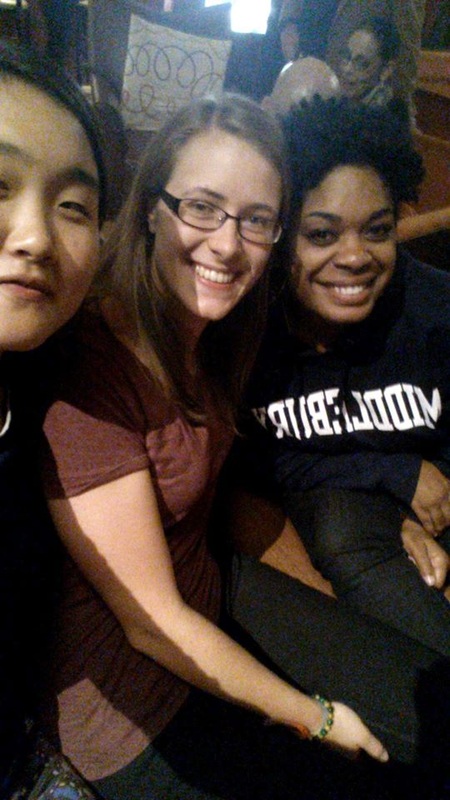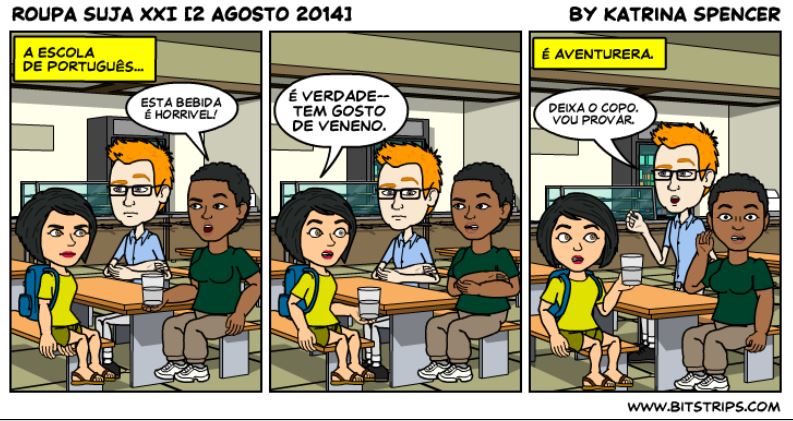 I sent the following to 40+ representatives at Spelman, Morehouse and Howard. August 31, 2014 Dear Foreign Language Representative: My name is Katrina Spencer and I am a student in the Graduate School of Library and Information Science (GSLIS) at the University of Illinois at Urbana-Champaign (UIUC). I write to inform you regarding an unique learning opportunity offered every summer through Middlebury College. Students from Historically Black Universities and Collleges (HBCUs) can receive full funding to attend, an estimated $8,310 value for costs of tuition, room and board. I have attended the schools twice studying both Spanish (2009) and Portuguese (2014) and can attest to their quality and impact. Middlebury College offers intensive language programs in Arabic, Chinese, French, German, Hebrew, Italian, Japanese, Korean, Portuguese, Russian and Spanish. (Nine of these schools are held in the state of Vermont while the Arabic and Italian schools have recently been held in California.) The schools last between six and eight weeks and the students live in dorms, attending four hours of language classes Monday through Friday mornings and participating in optional activities during the afternoon and on weekends. I find it urgently important to share this information with you as this summer only three black women participated in the Portuguese school, myself included, and I recognize the importance of not only bilingualism in a 21st century world, but also the rich opportunities for networking and for growth that arise every time we step out of our comfort zones, taking on new and unfamiliar experiences. Through the connections I made at Middlebury, I have taught English abroad in Spain, toured Washington, D.C. en route to interning at the Library of Congress and earned second and third families all over the world. Some of the most prominent figures within our community recognize the importance of being able to meaningfully engage with cultures outside of the United States: political writer Ta-Nehisi Coates speaks French and is a 2014 Middlebury alum; actor and rapper Will Smith speaks Spanish; and celebrated basketball player Kobe Bryant speaks Italian. I want to encourage this same spirit of multiculturalism with you and your students as I believe that the power of viewing one’s self as a citizen of the world will multiplies the number of opportunities we deem accessible and feasible. Please share widely, promote heavily and advertise frequently your knowledge of these language schools and scholarship opportunities with your students of promise. The investment of energy is certainly high; Vermont and California are far; and attending a predominantly white institution (PWI) is likely new. But again, the rewards and gains are many; the learning is real; and seeing the world through a new linguistic lens is invaluable. Please find more information about the Language Schools and funding here: http://www.middlebury.edu/ls/finaid/fellowships/hbcu... Thank you for your time and attention. I hope this message inspires you. You may contact me to continue this conversation.
0 Comments
 This summer I participated in Middlebury College’s Portuguese Language School. It was a 7-week, residential and immersion experience in which students attended four hours of language, culture and pronunciation classes per day followed by various, optional activities in the afternoon. What makes the experience unique is the Language Pledge. Soon after arriving to Middlebury, Vermont, students sign a document stating that they will communicate as exclusively as possible in the language they are studying. That means that words spoken or written shared with colleagues and administrators are all in the target language. Facebook posts. Streaming music on Pandora. Youtube videos. All meals. Pretty much everything with the exception of the occasional call home must be conducted in the target language. The motto every summer on the Middlebury campus is “NO ENGLISH SPOKEN HERE.” Other schools include Spanish, French, Hebrew, Japanese, Chinese, Russian, Arabic, Italian and Korean, the last of which begins in 2015. Spanish vs. Portuguese My first experience with Middlebury was in 2009. I was looking for an American program that would allow me to complete a master degree in Spanish while studying abroad. At that time, I found two: Middlebury College’s and New York University’s (NYU). Middlebury offered financial aid. NYU did not. So, in one calendar year, I completed my degree through Middlebury, graduating in 2010 after studying at its schools in Vermont, Spain and Mexico. One of the things I must highlight is that my first experience was at the graduate level. I’d already had nearly a decade of experience studying Spanish before arriving to Midd’s campus. I’d studied abroad in both Argentina and Spain; I’d traveled to Mexico, Nicaragua and Costa Rica; and I’d been a university-level Spanish instructor. So, speaking Spanish all day, every day, didn’t intimidate me. When it came to the Portuguese Language School, I’d only studied Portuguese for two semesters. While I wasn’t scared, avoiding “portuñol,” a convenient hybrid of “português” and “español,” I knew, would be a challenge. Another difference between the Spanish (SPAN) and the Portuguese (PORT) school is sheer size, or, number of enrollees. With all the students, administrators and instructors in the PORT school, there were maybe 50 participants. The SPAN school, I suspect, was at least twice the size of the PORT one. And, I feel confident suggesting that SPAN is the most frequently studied foreign language in the United States. So, there was a significantly large community of people, my father included, with whom I could communicate outside of Midd who’d understand me and be able to meaningfully discuss that summer's undertaking. Another difference between the schools is target audience. A large cohort of the graduate SPAN school aimed to become high school SPAN teachers or to gain an additional credential in order to improve the services they were already offering. This meant that the students were more mature in age and rather specific about learning goals. While there was a SPAN school for beginners (“principiantes”) in the SPAN School, I’d say that in the graduate program, many students fell into the 24-50-year-old age range. (After all, in theory, in order to earn a master degree, one usually completes a bachelor degree first. And, in the U.S., a large number of students complete undergrad between 18 and 22 years of age.) In the PORT school, some 75% of the students were between the ages of 18 and 25. Some were starting undergrad; some were in undergrad; some had just left undergrad. I am 29, so I didn’t fit into that age group. I also finished undergrad eight years ago in 2006. So , "How was your summer?" you ask? I'll tell you. What’s the right level for you? Based on the students who enroll in the PORT school, administrators must examine students and group them in what they deem appropriate levels. This summer, there were levels 1, 1.5, 2 and 3.5. Level 1 was for people who generally hadn’t studied PORT at all. Level 3.5 included a young man who’d already immersed himself in the language while studying in Brazil but wanted to formalize his knowledge. Based on an oral interview through Skype and an essay of introduction that described who I am, I was placed in level 2, and I struggled with this decision. The number “2” wasn’t the problem. I went to Middlebury with the expectation of reading and writing. I wanted to read authors who were new to me and reflect on what their works said about Lusophone identity. Level 2 was grammar grammar grammar. Specifically verb conjugation. My grammar wasn’t perfect going in, but I think it could have been placed on a lower level of priority. I wasn’t ready to write Portuguese sonnets, no, but 15 years of experience with Spanish, I felt, had prepared me for a different pace and/or quality of learning. The right level for me may have been 2.5 or 3. However, without having enough students to populate that course, and/or perhaps professors to teach them, I was downgraded to level 2. I fought with this for a long while. Yes, I spoke up. However, I became so exhausted by the resistance I met, that ultimately I gave up the fight. The benefit of remaining in level 2 was that I could participate in other activities because I didn’t have to, metaphorically speaking, remain ‘married to my books’ from sunrise to sundown. I sang in an a cappella group three times a week; I wrote for our weekly newsletter; and I created electronic “Dirty Laundry 21”/ “Roupa Suja 21” comic strips where I vented my frustrations, much to the delight of my peers, which added some joy and humor to my life. Would I fight harder next time? I’m not so sure. I doubt it. Ultimately, I just want to get along with people and foster peace about me. I’m not sure winning the 2 vs. 3.5 battle would have made me feel like a winner. It’s sort of like when you’re in a romantic relationship and you’re arguing and perhaps you’re right, but insisting on a point doesn’t really aid the union and foster feelings of love, you know? School vs. Summer Camp I’m not sure if the PORT School knows which ethos it wants to promote more greatly: the idea that it is a school that demands rigor and dedication or the idea that it is a residential experience akin to summer camp in which the activities outside of class are as important as what occurs within the classroom. Perhaps it wants to promote both equally. However, the academic work is recorded on a transcript and the connections with peers are monitored independently. The issue for me was that I was surrounded by people from 8:30am-2:40pm five days a week. When I had the chance to get away, I did because I needed to. I have some pretty strong introverted and highly-sensitive (HSP) qualities. And being stimulated by noise, people and conversation for extended periods of time was taxing for me. Moreover, there was—I’ll just say it—constant pressure to do, act, become involved, perform, participate, join. Frequently I simply needed to be alone. And that, beyond the many pages of grammar exercises, the multiple essays and being far and away from the people I love, was perhaps that greatest challenge of all. I’m hardly anti-social, I think. But my language school was asking a lot of me with poetry club, band club, yoga, cooking class, theater, samba, capoeira, academic talks, etc. Rest and “unplugging” were/are important to me and those values were not really supported/promoted. I understand that the program would likely prefer for there to be an excess of things to do as opposed to a lack. I also think, however, that there's a difference between an invitation to participate and the pressure to attend events. Recommendations Would you recommend Middlebury's Lanuguage Schools? Yes. And also no. I would recommend the PORT school to 18-24-year-olds who are really involved in extracurricular activities, who are extroverted and perhaps for whom grades won’t have a significant impact. I would recommend the PORT school to people who are headed to a Lusophone country directly following the program. I would not recommend this school to anyone who has dependents, those dependents being young or old, and must leave them in order to attend. I would not recommend this school to anyone who is overwhelmed by crowds and/or noise or who may be restless or claustrophobic. The PORT School caters to young people who are exceptionally active and able to easily balance academic activity with communal play. I’m not sure I’m one of those people. I found that I could do the former well, but found consistent difficulty doing the latter. It is no surprise to me that the four people who did not make it to the end of the program were all over the age of 35. They left the program for a variety of reasons, health being one of the reasons cited, familial responsibilities being another. However, it might be accurate to put all of these reasons under the umbrella term “failure to thrive” or “difficulty in adapting.” I believe there was truth in this/these categorizations. Diversity I didn’t really want to bring this up. Ta-nehisi Coates, however, did in his piece, “Acting French,” perhaps indirectly and more socially than racially. (Listen to him talk about his experience here.) I’ll say this: of the 45ish students, I believe 7 were “people of color.” There were three black American women including myself, two Mexican students from Mexico, a young lady who I believed was Latina and one student from Korea. In other words, three of these students were international students. So there were 4 American (U.S.) minorities. How do I feel about this? I felt there were too few people of color. I lamented the lack of black men. There are full scholarships for students coming from historically black colleges and universities (HBCUs) but I don’t know what efforts Midd makes to promote them. Does a scholarship exist if you don’t know it exists? Yes, I raised the issue of diversity with administration twice. I’ve considered writing directly to language instructors and administration at Spelman, Morehouse and Howard. I haven’t… yet. I have to contemplate whether or not this is my responsibility/place and how Midd, as an institution, would gauge this action. Moreover, I don’t quite understand why a student of color from Harvard, from Texas A&M or from any university I’ve attended in my long, academic career would be automatically ineligible for these awards merely because none is an HBCU. My energy for fighting is less and lower everyday. Would you go back? Yes, yes I would go back. I would not like to start studying a language from scratch with Midd. I don’t want to have an experience where I can’t say, “I’m cold” or “What was the homework assignment?” or “Do you have any Grey Poupon?” Kidding. Middlebury is indeed more than just language and play. It’s an opportunity for powerful network building. I can’t emphasize that enough. I have friends all over the United States who are Midd alums who are willing to support me, house me, feed me when I visit their states, to let me rub shoulders with their colleagues and to point me in the direction of advantageous opportunities. And, truthfully, you do learn the language you study. You don’t come out speaking perfectly, but you finish with the confidence to make mistakes in public. And that is a huge part of language learning: the confidence to take risks. When I hear Portuguese around me now, I’m not afraid to engage and I’m not deathly afraid of getting things wrong. The language is so familiar in my mouth that I converse, correctly and incorrectly, with whomever will listen. I also have a treasure chest of warm memories now all related to Vermont and the people I met there. Midd isn’t for everyone but it is with work, adjustment, limits and discipline, at the moment, for me. On another note, so much of any success I might have is related to taking risks, exercising faith and being able to tolerate discomfort and uncertainty. Midd, I suppose, is simply another type of experience that required me to do all of those things.  Because you wanted to know about my life, I write you this blog post. Monday of this week represented my 25th first day of school. And I feel like being reflective about it. Would you like to hear how the week went? I think you will understand then why my answer to “How are you? How’s it going? What’s up?” is so, as my former Ph.D. advisor liked to say, “fraught.” FLAS Imagine studying a foreign language diligently for a year and realizing that you can finance the remainder of your graduate education if you continue to do so by receiving an honor called the Foreign Language and Area Studies fellowship, popularly referred to as the “FLAS.” The FLAS asks that students take one not so commonly studied language course and one area studies course (history, religion, culture, etc.) to satisfy its requirements and in turn the U.S. Department of Education awards students the cost of tuition, the price of all course fees and a stipend. Imagine trusting for about 5 months that this is the primary way you will pay for your studies. And then imagine that not happening… yet… when you expected it to. If you’ve successfully imagined this scenario, then you will know the situation that I’m in. It’s not just me and Brazilian Portuguese. It’s every student—across the nation—who took the same or similar steps that I did. Bureaucratic delays have cast uncertainty upon the proverbial waters and students and administration alike across campus scramble to not remedy, to not rectify, but to react. Despite said delays, the rent is still due (smiley face), students gotta eat and bills gotta be paid. By the end of September, we will definitively know what will become of the FLAS but at this point, students of Portuguese and other foreign languages must determine whether to walk away from the award entirely, from whom to request loans and how to manage their course schedules in enrolling for studies that may ultimately count a electives and detract from degree progress. Am I complaining? I’m not. I’m explicating. Were it not for my faith, my supportive department and the maturity my ears, evinced by the ever-increasing number of white hairs on my head, I might be a bit more uncomfortable. But one learns with age that stress isn’t really so productive. And I don’t need an ulcer. Wanna know what else I tackled this week? Well, I will tell you. LEEP My department has two modes of completing degree requirements: one is with traditional on-campus courses that meet face-to-face; the second is an online program called LEEP. More and more courses, however, are being offered through LEEP and fewer and fewer in-person. I won’t debate the pros and cons here. I’ll simply report my experience. Monday evening I had my first LEEP meeting. A friend, Kate R., worked hard to help me to download the right software a week in advance. Berenice V. and Franklin K. worked at least half an hour to help me to establish a reliable internet connection before the course began. Then “class” began. I entered a virtual room where I heard the professor’s voice and none of my peers’ voices. I saw no faces and no avatars. And chat was relegated to a box in the lower left-hand side of the screen in a window perhaps not more than two inches in height or in width. To put it honestly, not only did I feel constrained, I immediately recognized how the collegial, warm and human aspects of the “interaction” were lost. The professor didn’t ask us to speak to each other or about ourselves. And I couldn’t tell ‘who’ my classmates were. Then a storm started outside. In this part of Illinois, when it decides to rain, it pours. The intervals and frequently short, but the sheer amount of water is impressive. The rain seemed to impact internet connectivity because I was kicked out of the virtual room at least twice. It was unfortunate and uncomfortable and in that moment I knew that if these were the problems I would encounter for the next 14 weeks with all of my three LEEP courses, things weren’t looking so good. I made the necessary changes. Don’t ask what they were. Graduate Assistant This week I also started my new job as a graduate assistant in the Main Library. The librarians and my co-workers have been extremely supportive in directing, instructing, narrating steps and supervising. A whole new series of discussions has been raised in my life: If a patron needs 40 minutes of help and not 5, do I leave the Main Desk to help him? If a patron invites you out to lunch to thank you for your diligent work, do you go? If you start to respond to a virtual reference question at the Main Desk, but you need to move to the Virtual Reference desk, according to your schedule, what do you do with the conversation you’ve initiated? While training was intensive and especially demanding, I have to say also that the team has demonstrated a camaraderie and sisterhood that is remarkable and appreciated. Other I could tell you about… ...the conversation(s) I’ve been having in which people who believe in my intellect insist that I try pursuing a Ph.D. anew. ...singing with the Black Chorus. ...designing an independent study around the works of Luís Fernando Veríssimo. ...the success of Kate McD’s hybrid course. ...being turned down for an attractive job because I have 10 hours to give and not 20. ...how my hair is growing. ...the Korean food I tried last evening in Champaign. But sometimes I just don’t have the energy. Conclusions It’s good to have support/so many supportive people in my life. If I’m vague when you ask me “How are you? How’s it going? What’s up?,” it has nothing to do with you. I have… a lot going on. Here I need to give shout-outs to Caitlin C., Caitlin A.H., Wendy G., Beth W., Cindy I., always Alonso A., Amani A, Kate McD and Linda S. And Ruby Bridges who helps me to contextualize everything. (smile) Thank you for being my rocks this week. A last addendum… in form of a confession: I drank three beverages high in sugar this week and I will now repent.  (Also known as "Is there room for me in your narrative?") A satirical exam(ination) Mark one point for each affirmative answer. AUBE: Genotype 1. Can you use a food to describe your skin tone, i.e. mocha, chocolate, caramel, café au lait? AUBE: Religion 2. Are you a Christian? Born again, Baptist, back-slidden? AUBE: Language 3. Do you believe black people have exclusive use of the word “ni$$a” and all its variants? AUBE: Cuisine 4. Are any of the following regularly served at your family gatherings: peach cobbler, watermelon, chitlins, rabbit, ‘gator, black eyed peas, corn bread, sweet tea, greens, hamhocks, oxtails? AUBE: Hair 5. Can you unfailingly recognize a weave from a 100-foot distance? Or, does “horse vs. human” mean something to you? Or, did you know the meaning of “lye” before reaching puberty? AUBE: Attire 6. Does your weekend attire [erroneously] suggest that you are part of an athletic team? For example, a white beater top, sweats/warm-ups and sneakers? AUBE: Entertainment 7. Can you quote any line from the following films: The Color Purple, Coming to America, The Wiz, Love Jones? AUBE: Dance 8. Do you know and perform an “old school dance” at both formal and informal gatherings? For example, the running man, the Roger Rabbit, the bounce? AUBE: College 9. Did you attend an HBCU? AUBE: Sports 10. Do you have an opinion, any at all, about LeBron James’ return to Cleveland? AUBE: Night Life 11. Have you tasted every drink referenced in Jamie Foxx’s Blame It on the Alcohol? (“Blame it on the Goose, gotchu feelin’loose/ blame it on the ‘tron, got you in the zone… Blame it on the vodka, Blame it on the henny, Blame it on the Blue Top, Got you feeling dizzy”) AUBE: The Motherland 12. Do you have a conflicted view regarding Africa? You’re both attracted to its exoticism (safaris, the Serengeti, sunsets…) and repulsed by images that represent its wars, disease and hunger in the media? 0-3 points You must have attended a PWI (predominantly white institution). You’ve lost touch with your roots. You have success outside the black community but the insiders aren’t sure how to regard you as they don’t know where your loyalties lie. However, you know that you only answer to yourself. 4-6 points You likely have a parent who traces his/her roots outside of the U.S., but you’ve learned how to fit in, whether it be with big hoop earrings and a ceramic flat iron or an automatic disregard for all things “white.” You try not to let your “peers” catch you slippin’. You can rap to both Tupac and Biggie. You can butterfly and are still perfecting your moonwalk. But you still love your roti, your stew, your patties, your curry, your sorrel, your egusi and garri, your black beans and your jolof rice. You constantly straddle two worlds. 7-9 points You think these measurements are silly and inherently damaging. You’re not even sure why you took this so-called “test.” You wonder why we are still subjecting each other to new versions of the brown paper bag test. You are exasperated. Are we not yet more enlightened than that? And you are about to head out the door to grab some KFC as soon as you can get those baby hairs to lie down or curl pattern to set underneath your wave cap. 10-12 points You’re in. You made it. You’re black enough. You are at the head of every rally for every black man unjustly killed. You spot every micoragression uttered within a one-mile radius of you. The pre-party for the Black Student Union happens at your place—because, naturally, you’re the president. You own some paraphernalia with the Pan-African colors. Your hair is still a topic of debate for you and for others. All of your activity addresses issues of race. And secretly you are exhausted performing your racial identity. But no one needs to know that. Congratulations. You are black par excellence. |
AuthorMy name is Katrina Spencer. I'm a librarian. Archives
February 2020
Categories |

 RSS Feed
RSS Feed